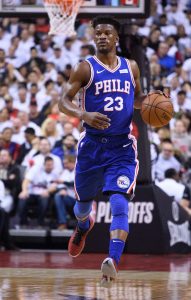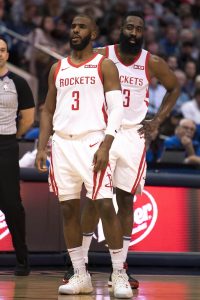After coming agonizingly close to the NBA Finals in 2018, the Rockets were once again the most serious threat in the Western Conference to knock off the Warriors in 2019. This time around though, the two teams met in the second round, and Houston blew a golden opportunity, losing Game 6 to a Warriors team that was missing Kevin Durant.
Unlike in 2018, when the Rockets could point to Chris Paul‘s hamstring injury and a fluky 0-for-27 run on three-pointers in Game 7 as reasons why they couldn’t sneak past the Warriors, this year’s loss felt more demoralizing, and the team doesn’t appear quite as likely to simply run things back with the same core.
Here are five key questions facing the franchise this summer:
1. How real is this Jimmy Butler thing?
Multiple reports in recent weeks have identified Jimmy Butler as the Rockets’ top free agent target. Houston is reportedly “extremely confident” about its chances to land Butler. There are just a few potential roadblocks:
- Butler’s level of interest in the Rockets remains unclear.
- Butler will command a maximum salary of $32.7MM and the Rockets have no cap room.
- The Sixers would have to agree to sign-and-trade Butler to Houston, despite the fact that allowing him to walk could create significant cap room.
- Base year compensation restrictions would likely force the two teams to involve a third club for salary-matching purposes.
- Even if the Rockets could work out a deal, it would almost certainly cost them Eric Gordon, Clint Capela, and maybe other pieces.
- The Rockets would become hard-capped at the tax apron by acquiring a player via sign-and-trade, substantially limiting their ability to add reinforcements around James Harden, Paul, Butler, and perhaps P.J. Tucker.
The sheer number of obstacles standing in the way of a Rockets acquisition of Butler should make it a long shot. And even if GM Daryl Morey could pull it off, I’m not convinced it would be the right move. Harden, Paul, and Butler all have big personalities and ball-dominant playing styles that could clash. The hard cap would limit Houston’s ability to acquire quality depth. And making further trades would be nearly impossible due to a lack of mid-level type salaries on the Rockets’ books.
It’d be a mistake to rule out the possibility of Butler – a Texas native – heading to the Rockets, given the creativity we’ve seen from Morey over the years. But if the Sixers are willing to offer Butler five years at the maximum salary or something close to it, I have to imagine it’s back to the drawing board for the Rockets’ front office.
2. If the Rockets can’t land Butler, would they still shake up their roster?
Virtually every Rocket besides Harden has been mentioned in trade rumors since the team’s season ended. If Houston really wants to land Butler, trades will be necessary, but if the club big-game hunt falls short, there’d be no obligation to continue shopping the likes of Gordon, Capela, and Tucker.
While Morey should be lauded for always trying to find upgrades, it’s hard to envision many realistic scenarios that would allow the team to upgrade on Gordon and Tucker, who have been high-level contributors in Houston over the last two years on very reasonable contracts.
Capela is a different story. His contract is actually fairly team-friendly as well, particularly after he failed to meet some incentives in 2018, dropping his 2019/10 cap hit from $16.4MM to $14.9MM. But the Rockets’ most effective lineups in the postseason have often featured Tucker as the de facto center in Capela’s place. Given the Rockets’ preference for constant switches in defense, Capela’s limited ability to defend on the perimeter can burn them.
Whether or not they land Butler, the Rockets may shop Capela, who should draw interest from several teams in need of a rim-running center — I could see the Kings eagerly pursuing a deal for the big man to replace RFA-to-be Willie Cauley-Stein, for instance. If the Rockets could pick up an asset or two for Capela, it would give the team added cap flexibility and a few more trade options.
For what it’s worth, Paul has been mentioned in some trade rumors this spring, but his contract would make him virtually impossible to move, and I don’t expect the Rockets to go that route this offseason.
3. How serious is the supposed Harden/Paul rift?
Speaking of Paul, there have been multiple reports since the end of the season suggesting that he and Harden haven’t exactly been seeing eye-to-eye. Vincent Goodwill of Yahoo Sports went so far as to describe their relationship as “unsalvageable,” adding that CP3 had asked to be traded and Harden had issued a “him-or-me” ultimatum.
All involved parties have vociferously denied those allegations. Still, Goodwill wasn’t the only reporter to write about the discord between the star guards. A report from ESPN’s Tim MacMahon touched many of the same bases, without going so far as to call their relationship unsalvageable. It seems clear that the two stars grated on one another at times, and disagreed on how the Rockets’ offense should be run.
How problematic will that be for the Rockets going forward? Based on everything they’ve said in recent weeks, they’re willing to work through it — and they should. After all, with Kevin Durant and Klay Thompson set to miss most or all of the 2019/20 season, the Rockets should have a much clearer path to the NBA Finals in 2020 than they have the last two years. This isn’t the time to let in-fighting break up the team.
Based on the details that have surfaced in recent weeks, the Harden/Paul relationship will be worth watching going forward, and there’s a chance that it’s a powder keg that could eventually explode. But it’s in the team’s and the players’ best interests for everyone involved to try to get on the same page, since the Rockets won’t trade Harden and likely can’t trade Paul for a reasonable return.
4. If the Rockets don’t acquire Butler or another star, who should the team target with the mid-level?
The Rockets will have some form of mid-level exception available this offseason. Whether it’s the full mid-level (projected to be worth $9.25MM) or the taxpayer MLE ($5.71MM) will depend on how the rest of the club’s cap sheet looks, and whether or not the team is comfortable with being hard-capped. Using more than the taxpayer MLE would prohibit Houston from spending beyond the apron.
Last season, the Rockets used part of their mid-level to sign players like Isaiah Hartenstein and Gary Clark, forgoing a veteran addition. I don’t expect the team to take that same route this season. There are simply too many quality role players available on the open market, and the Rockets have a slightly cleaner cap sheet and a clearer path to using the full mid-level.
Sam Amick of The Athletic recently reported that Danny Green, Jeremy Lamb, Al-Farouq Aminu, DeAndre Jordan, Brook Lopez, and Kevon Looney will be among the Rockets’ targets this offseason. That’s a good list, and reflects what the team is looking for, particularly on the wing.
The bigs named by Amick are especially interesting — it’s not clear if those players would be targets only in the event that the Rockets move Capela, or if the team would look to add another center even if its incumbent starter returns. It’s intriguing to imagine what a floor-spacing, rim-protecting big man like Lopez could do in Houston, though I expect he could be out of the team’s price range. Looney’s switchability on defense would also make him a great fit for the Rockets.
With perhaps a couple exceptions, it might be unrealistic to expect any of these players to be available for the mid-level, since I expect most of them to land eight-figure annual salaries. But NBA players are fond of Houston, and the opportunity to compete for a championship may inspire some to accept a slight discount. Using the mid-level to sign Tucker in 2017 was one of the Rockets’ best moves in recent years, and I’d expect the team to try to acquire a similar impact player with the MLE this time around.
If they devote their full MLE to a single player, the Rockets will once again have to rely on the minimum salary exception to fill out its bench. That didn’t work out too well last summer, as none of Carmelo Anthony, Michael Carter-Williams, and James Ennis finished the season with the team. But Houston showed during the season that it could find solid contributors on the cheap, signing Austin Rivers, Kenneth Faried, and Danuel House to minimum deals. The club will have to hope to repeat that success in 2019/20.
5. Will the Rockets extend Mike D’Antoni?
It’s extremely rare for an NBA team to offer an incentive-heavy contract to its head coach or to ask a successful coach to enter the final year of his contract as a “lame duck” without a new deal. The Rockets did the first and seem prepared to do the second, having played hardball in negotiations with D’Antoni so far this offseason.
D’Antoni’s contract situation may not have a tangible effect on the Rockets’ season — it’s not as if he’ll only give an 80% effort instead of 100% if he knows he’s on an expiring deal. Given the reported tension between the Rockets’ two stars though, it seems unnecessary to add more uncertainty to the mix by not locking up a coach who has won 173 regular season games and four playoff series over the last three years.
Additionally, D’Antoni’s ability to secure top assistants may be compromised to some extent, since his preferred targets know he doesn’t have security beyond the 2019/20 season.
The Rockets and D’Antoni still have plenty of time to work out an agreement that adds an extra year or two to his current deal, but it’s somewhat surprising that they haven’t already found common ground.
Check out the Houston Rockets’ offseason salary cap outlook right here.
Salary information from Basketball Insiders was used in the creation of this post. Photos courtesy of USA Today Sports Images.

The Butler thing is not a thing, and it would be an awful fit if it actually happened. Butler only wants to make sure Philly comes up with that 190. Why would he agree to deplete the team he would be going to?– he wants money not Texas.
You seem to answer your own question — if he wants money, he doesn’t care which team he is on so a sign and trade could be the only way to get it.
He can only get the the 5/190 with Philly. An S&T bans that.
The Rockets need to get rid of D’Antoni. He is one of the most overrated coaches in NBA history. I would love to see the Rockets keep him, though. That guarantees they will not win anything and he will runHarden into the ground.
I used to feel the same until he came to coach the rox .. I feel very different about him now
If yahoo sports and ESPN are the ones pushing this Paul/Harden discord story, then you know it’s not true.
Yep. And the guy that wrote the story was tweeting about how he hoped Harden would break a bone and nothing but negative things. It’s almost like Harden banged his wife or something. Really not believable